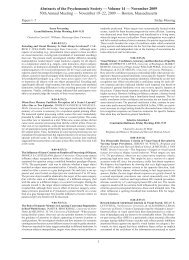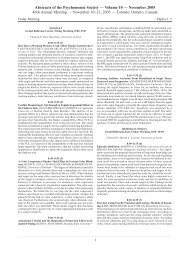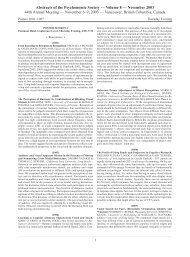S1 (FriAM 1-65) - The Psychonomic Society
S1 (FriAM 1-65) - The Psychonomic Society
S1 (FriAM 1-65) - The Psychonomic Society
You also want an ePaper? Increase the reach of your titles
YUMPU automatically turns print PDFs into web optimized ePapers that Google loves.
Posters 2069–2075 Friday Noon<br />
trieval of the Indonesian–English pair and enhanced retrieval of only<br />
the keyword subtask. However, higher imagery value keywords influenced<br />
both the keyword and English retrieval subtasks while making<br />
little or no difference in overall vocabulary retrieval performance.<br />
This unexpected but interesting pattern of results is discussed and potentially<br />
explained.<br />
(2069)<br />
Constrained Retrieval in Recognition Memory? JUSTIN KANTNER<br />
& D. STEPHEN LINDSAY, University of Victoria (sponsored by<br />
D. Stephen Lindsay)—Some prominent theories of recognition memory<br />
hold that recognition judgments are based on the degree of match<br />
between test probes and all previously encountered exemplars. Jacoby<br />
and his colleagues, by contrast, have recently argued that recognition<br />
judgments may be supported in part by a process of “constrained retrieval”<br />
whereby individuals selectively search memory for items from<br />
a particular contextual source. We critique Jacoby’s evidence for this<br />
claim and report new experiments designed to detect constrained retrieval<br />
in a recognition task. <strong>The</strong> results indicate that subjects can indeed<br />
constrain retrieval in response to test probes under some conditions,<br />
but not under others. We discuss the implications of this pattern<br />
of significant and null effects for theories of recognition memory.<br />
(2070)<br />
Pattern Classification of fMRI Retrieval States During Recognition<br />
Memory. JOEL R. QUAMME & KENNETH A. NORMAN, Princeton<br />
University—Pattern classification algorithms have been used in fMRI<br />
to examine distributed activity patterns in the brain associated with<br />
different cognitive states. In this study, subjects studied singular and<br />
plural words, and performed recognition memory tasks in the scanner.<br />
We trained a simple neural network classifier to distinguish between<br />
subjects’ fMRI brain patterns when paying attention to recollected details<br />
about a previously studied item, and when paying attention to<br />
general feelings of item familiarity. <strong>The</strong>n, in a second phase, subjects<br />
made old–new judgments to studied, nonstudied, and switched-plural<br />
versions of studied words (e.g., study fleas, test flea). After training<br />
the classifier on the first phase, we tested it on brain activity from the<br />
second phase to obtain the classifier’s “best guess” concerning the<br />
subject’s retrieval state during old, new, and switched-plural trials. We<br />
report on the relationship between the classifier’s output and subjects’<br />
behavioral responses in this task.<br />
(2071)<br />
Neuroimaging and Electromyographic Evidence for Response<br />
Conflict in Recognition Tasks. TRAVIS L. SEYMOUR, University<br />
of California, Santa Cruz, & ERIC H. SCHUMACHER, Georgia Institute<br />
of Technology—How do memory retrieval processes lead to<br />
overt responses in strategic recognition tasks? <strong>The</strong> Jacoby model proposes<br />
that the influences of both familiarity and recollection processes<br />
combine to select appropriate recognition responses, but does not account<br />
for response times (RTs). An extended model designed to account<br />
for accuracy and RT (Seymour, 2001) suggests that parallel familiarity<br />
and recollection-based task-sets can lead to response conflict<br />
that must be resolved by control processes. We tested this prediction<br />
by using brain activation and electromyographic measures during an<br />
exclude recognition task. In Experiment 1, we measured brain activation<br />
from cortical regions sensitive to response conflict and found<br />
greater activity for conflict than for filler trials. Experiment 2 used<br />
electromyographic evidence to replicate this finding with a measure<br />
incontrovertibly related to motor execution. <strong>The</strong>se results are consistent<br />
with the parallel task-set model’s assumption that recognition,<br />
motor, and conflict monitoring processes interact in strategic retrieval<br />
tasks.<br />
(2072)<br />
Retrieval Process of Autobiographical Memory and Oldness of<br />
Episode. TAKASHI HORIUCHI, Okayama University—<strong>The</strong> purpose<br />
of this study was to examine how the difference of oldness of episode<br />
79<br />
affected the retrieval process of an autobiographical memory. Sixteen<br />
university students participated in the experiment. In each trial, the<br />
participant was assigned to either the university or the junior high<br />
school period condition. In both conditions, the participant was asked<br />
to retrieve an episode associated with each cue word, and reported<br />
“remember,” “know,” or “no.” Estimates derived from an independent<br />
remember–know procedure (Jacoby, 1998) showed that the university<br />
period condition was higher in both the intentional and the automatic<br />
process than was the junior high school period condition.<br />
• METACOGNITION •<br />
(2073)<br />
Exploring Undetected Errors in Skilled Cognitive Activity.<br />
LESLIE A. ADERHOLD & RICHARD A. CARLSON, Pennsylvania<br />
State University—Increased skill typically leads to faster performance<br />
and fewer errors. <strong>The</strong>se improvements result in part from more concise<br />
mental representations. However, more concise representations<br />
may sometimes contribute to characteristic errors and failures of monitoring<br />
at high levels of skill. For example, even skilled writers may<br />
find it difficult to proofread their own work. Participants in several<br />
studies practiced a rule-application task, checking for rule violations<br />
and reporting confidence in their responses. Some error types persisted<br />
at high levels of skill, even when speed–accuracy trade-offs<br />
were ruled out. Furthermore, participants often reported very high<br />
confidence in error responses, persisted in those errors, and continued<br />
to report high confidence when provided the opportunity to recheck<br />
their work. We consider possible explanations in terms of motivation,<br />
implicit monitoring on the basis of fluency, and representational constraints<br />
on metacognition. Understanding failures of error monitoring<br />
in high-performance skills may have important practical implications.<br />
(2074)<br />
Metacomprehension of Statistical Concepts. RUTH H. MAKI,<br />
CURTIS CRAIG, J. L. RUDINE, & ELIZABETH A. MURRAY, Texas<br />
Tech University—We investigated transfer appropriate monitoring<br />
(TAM) in metacomprehension of statistical concepts. During learning,<br />
participants either calculated answers to problems or read the answers.<br />
Learning was tested with multiple-choice and calculation tests.<br />
TAM suggests that calculating during learning would lead to more accurate<br />
judgments on the calculation test, and reading during learning<br />
would lead to more accurate judgments on the multiple-choice tests.<br />
<strong>The</strong> learning activity � test interaction was not significant with metacomprehension<br />
accuracy, but it did occur with bias. Calculating during<br />
learning produced overconfidence on the multiple-choice test, but<br />
it had no effect on the calculation test. Overall, relative prediction accuracy<br />
was higher for participants who had previously taken a statistics<br />
course and for participants who did not calculate during learning.<br />
<strong>The</strong>se results suggest that calculation during learning interferes with<br />
students’ abilities to judge how well they are learning, and it may lead<br />
to overconfidence.<br />
(2075)<br />
Study Strategies—Do Deaf College Students Do It Differently?<br />
MARY DIANE CLARK & LASHAUN A. WILLIAMS, Gallaudet<br />
University—Looking at the literature on test-taking strategies, underachieving<br />
groups tended to show less preparation when studying for<br />
tests and developed fewer strategies for the behavior, and those strategies<br />
tended to be ineffective (Bornhold, 2002; Ellis & Ryan, 2003).<br />
In addition, Ellis and Ryan found that these students had lower levels<br />
of test-taking self-efficacy. More specifically for deaf test-takers,<br />
Chaliff and Toranzo (2000) found that the test construction also impacted<br />
their students’ results on these kinds of tests. <strong>The</strong> English syntax<br />
of the questions as well as the question format caused deaf testtakers<br />
difficulty in demonstrating their knowledge. Chaliff and<br />
Toranzo related these difficulties to poor reading strategies. <strong>The</strong> current<br />
study elicited strategies from a group of deaf college students.<br />
Content analysis shows more superficial strategies that appear to re-





